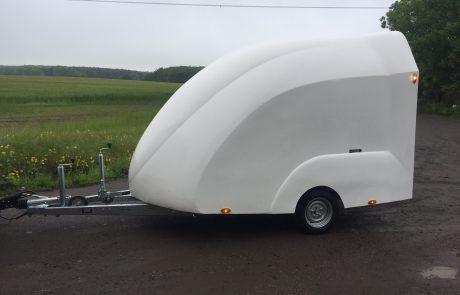There is a lot to consider when it comes to driving with any form of trailer, and how it will impact your driving performance and overall safety of navigating the roads. From visibility to traction you also have to take into consideration what kind you have, and how to adjust your drive to new restrictions. A box trailer will affect your driving differently to heavy duty trailers.
Maximum Allocated Mass (MAM)
Knowing what you can legally carry is the first thing to always consider. On a full UK driving licence issued after 1st January 1997, as long as your car weighs 3,500kg, you can carry a trailer up to 750kg. If passed before 1st January 1997, as long as the combined weight of the vehicle and trailer is 8,250kg or less, you’re allowed to travel. Any larger combinations require further additions to your licence and all this can be found on the Government website. Specific weight restrictions will be found on the vehicle manufacture plates or in the cars manual, so you find what heavy duty car trailer will be best suited for your vehicle.
Prior Checks
Before setting off with your box trailer or heavy duty trailer, make sure you have used the manufacturer's advice. When it comes to connecting the trailer to the vehicle, ensure all connections and cables are in full working condition and there are no damages. Make sure all wheels and tires on both the car and trailer are in good condition, correctly pumped and have a tread of 1.6mm. Mudguards are a must on all heavy duty car trailers.
Rules of the Road
The highway code treats cars pulling trailers as any long vehicle. You must leave plenty of room for all vehicles especially motorcycles and cycles, the extra length on the car will affect maneuvering and the ability to overtake as well as the extra weight affecting braking and acceleration. Speed limits to any vehicle with a trailer is lowered; 30mph in a built up area, 50 on a single carriageway and 60 on a dual carriageway or motorway. You must always remain on the outside lane on a carriageway with more than three lanes.
Extras
When carrying a heavy duty car trailer alterations to your vehicle may be required. If the heavy duty trailer is wider than the vehicle pulling it, you may have to attach additional mirrors as an unsuitable vision of the road can result in a penalty. All trailers weighing over 750kg must have working brakes. Smaller box trailers do come with brakes, however this can be optional.
Severe Weather
When unsure about upcoming weather conditions, it’s recommended that you always keep updated with regular checks on the weather conditions. Best practice is to check a week before travelling and always keep any passengers informed as not to distress them. Make sure both vehicle and trailer are both covered in appropriate reflective markings. If conditions become extremely windy, ensure that both hands are firmly on the wheel to anticipate any sudden movements. Keep to main roads, may you come into complications, staying to main roads allows you to be accessible to any assistance needed. You should also keep aware of any possible changes to your route ahead. Finally, incase of some emergency where you will find yourself stranded, make sure you have warm clothes and a torch.
Any form of extra weight on your vehicle can have an impact on your vehicles abilities such as acceleration, braking, handling and so on. Preparing yourself for this is vital in ensuring the safety of your passengers, your vehicle and yourself.












No Comments